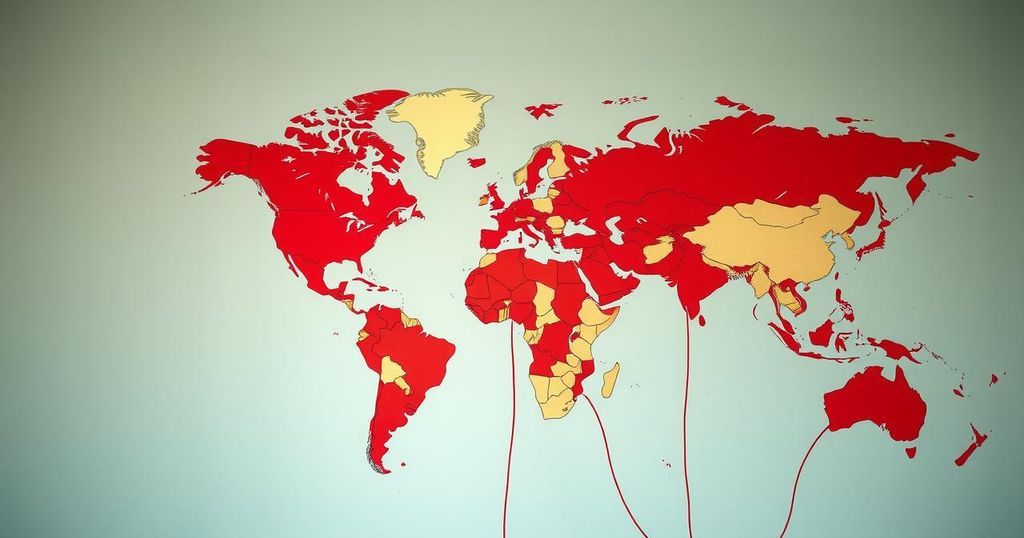Global Elections of 2024: Shifting Political Landscapes and Geopolitical Implications

In 2024, around 4 billion people participated in global elections, marking a historic democratic engagement. Key developments included Donald Trump’s re-election in the U.S., the rise of leftist governance in Mexico, political turmoil in Europe, and a coalition government in South Africa amid various international challenges. These outcomes are poised to shape future geopolitical relations and policy directions significantly.
In 2024, approximately 4 billion people participated in elections, contributing to a historically significant democratic engagement worldwide. While the ruling parties in South Africa and India experienced diminished support due to allegations of corruption and democratic erosion, several European nations faced political upheaval with a rise in far-right parties, and the governments of France and Germany collapsed. In the United States, Donald Trump orchestrated a remarkable political resurgence.
The re-election of Donald Trump in the U.S. on November 5 was notable, marking a historical comeback as he overcame significant legal adversities and garnered wide-ranging electoral support by capitalizing on economic discontent and anti-immigration sentiments. Analysts are currently dissecting this electoral outcome, noting the Republican advantage among non-college-educated voters, particularly men, and the regained Republican control over Congress which may facilitate Trump’s policy initiatives.
In India, Prime Minister Narendra Modi’s party faced unexpected challenges, resulting in a coalition government that many view as a victory for democratic principles. The coalition could hinder Modi’s previously anticipated controversial policies, especially concerning minority rights. Modi’s foreign policy remains independent, maintaining ties with Russia while fostering relations with the U.S. amid rising geopolitical tensions.
Indonesia elected Prabowo Subianto amid electoral irregularities, reflecting a significant shift in its governance despite his controversial past. Prabowo’s stance may lead him to align with Beijing rather than Washington, challenging Trump’s administration’s objectives in the Pacific.
France underwent political turmoil following President Emmanuel Macron’s snap election announcement, which resulted in a fragmented parliament. This chaos signifies potential difficulties in effectively addressing economic issues and contributing to European security, particularly concerning support for Ukraine against Russian aggression.
The United Kingdom experienced a shift as the Labour Party toppled the Conservative government, but the new Prime Minister, Keir Starmer, faces popular discontent and challenges regarding social services and immigration policy.
Mexico saw Claudia Sheinbaum elected as the first woman and first Jewish president, inheriting a strong economy and continuing López Obrador’s agenda, despite controversies surrounding judicial reforms. In Venezuela, Nicolás Maduro claimed a contested victory, further complicating the already dire economic climate amidst mass protests against his leadership.
South Africa’s African National Congress lost its parliamentary majority for the first time in history, necessitating a coalition government. Although some economic indicators have shown improvement, the country still grapples with significant social challenges, including poverty and unemployment.
The article discusses the significant global elections that took place in 2024, highlighting the impact of these elections on international politics and governance. The report touches on various countries, notably the U.S., India, Europe, and South Africa, focusing on the political dynamics and shifting allegiances that emerged during this pivotal year. Each region’s election outcomes reflect broader trends in political sentiment, governmental stability, and public response to leadership and policy.
In conclusion, the elections of 2024 demonstrate a profound shift in international political landscapes, with notable upheaval in established governments and emerging trends in voter sentiment across various regions. The outcomes in the U.S., India, Europe, and Latin America will likely influence global geopolitical dynamics and policy directions for years to come, evidenced by the electoral patterns and the public’s response to leadership and governance.
Original Source: www.semafor.com







